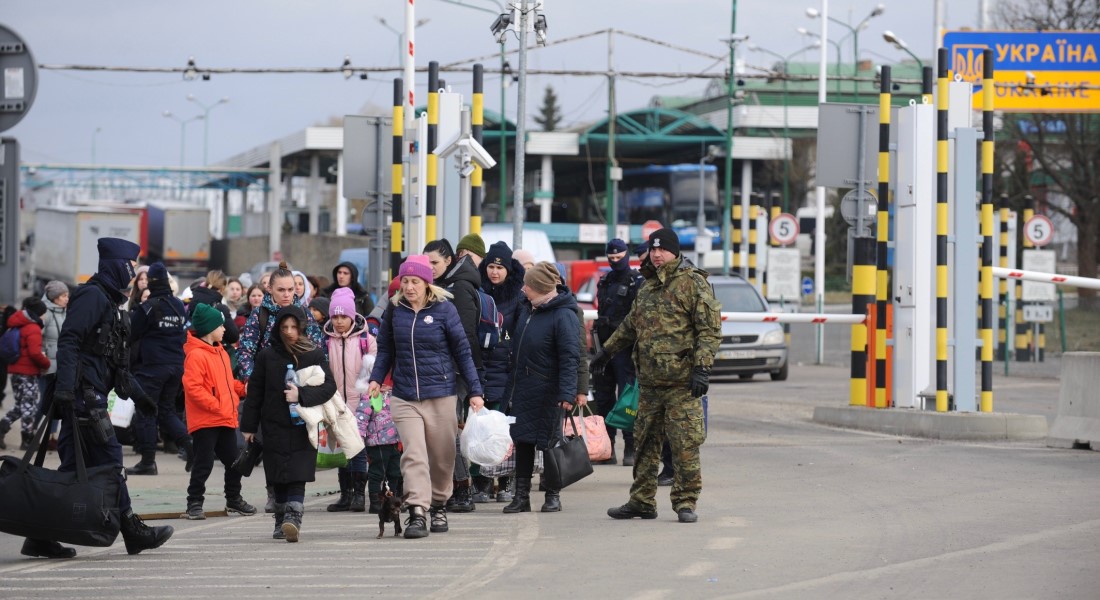Ukrainian refugees in Denmark struggle with symptoms of post-traumatic stress
The first comprehensive study of Ukrainian refugees' lives in Denmark shows that almost one in three show signs of post-traumatic stress disorder, PTSD. But at the same time, there is widespread trust in Danish society. Every second refugee would like to stay in Denmark.

Almost 40,000 Ukrainians have fled to Denmark since Russia's invasion in February 2022. Now, the results of a large survey provide the first comprehensive overview of Ukrainian refugees' background and life in Denmark.
The study shows that the majority are thriving, but also that many of the Ukrainian refugees living here struggle with various forms of mental health issues.
Over 40 per cent have personally witnessed acts of war, while almost as many have lost family or friends during the first year after the invasion. These experiences leave their mark. 29.4 per cent of the survey's respondents report symptoms so severe that it suggests they may have developed an actual post-traumatic stress disorder, also known as PTSD.
"We are dealing with a group that has been exposed to many acts of war before they left Ukraine. Therefore, we also see that one third show signs of PTSD to a degree where you should be aware of whether they have an actual diagnosis," says Associate Professor Karen-Inge Karstoft from the Department of Psychology.
She is heading the project 'DARECO - The Danish Refugee Cohort', which follows almost 7,000 of the approximately 18,000 adult Ukrainians who were granted residence in Denmark from the end of February 2022 until 1 February 2023. The project is supported by the Carlsberg Foundation.
The high proportion of refugees with PTSD-like symptoms is a challenge for both the individual and society.
"The group of refugees who show symptoms of PTSD are doing poorly across the board. They have low mental wellbeing and higher alcohol consumption, and they struggle with daily tasks," explains Karen-Inge Karstoft.
"If you have such a painful condition, it's harder to participate in society and the labour market in Denmark – or maybe later in Ukraine. So it's also a societal problem."
Figure: Ukrainian refugees' three most significant problems in everyday life (per cent)
More people with mental health problems than expected
The challenges are compounded by the fact that almost every second refugee in the PTSD group (13.5 per cent of all respondents) also shows signs of the sub-diagnosis 'complex PTSD'. Here, problems with engaging in human relationships, negative self-perception and difficulties controlling one's emotional reactions join the other PTSD symptoms.
It is quite a high figure when approximately one in three report significant PTSD symptoms.
According to Karen-Inge Karstoft, the proportion of refugees with severe mental health problems is roughly in line with what you would normally expect among war refugees. However, she believes that in this case, the proportion is higher than expected:
"We can see that we are generally talking about a well-educated group of people who typically left the country at the beginning of the war. They will therefore often have experienced fewer direct acts of war than someone who left later. In addition, they have been received on favourable terms in Denmark, and few have experienced discrimination or uncertainty about their residence permits. Taking these things into account, it is quite a high figure when approximately one in three report significant PTSD symptoms."
Ultimately, a psychiatric examination is required to diagnose PTSD, but Karen-Inge Karstoft hopes the project can help identify those who need help. In the worst-case scenario, untreated PTSD can end up as a chronic, debilitating disorder.
High confidence in Denmark
But the picture is not all negative. Seven out of ten have no symptoms of PTSD, and the majority report that they have a moderate or high level of mental wellbeing here in Denmark.
The level of trust and the fact that so many want to stay in Denmark has surprised me.
In addition, the meeting with Denmark has been a positive experience for the vast majority. 92.5 per cent have a high or very high degree of trust in Danish authorities and authorities, and every other person (49.5 per cent) states that they want to stay in Denmark permanently - even when they can safely return to Ukraine.
Karen-Inge Karstoft points out that the broad popular support for Ukraine and the Danish Parliament's special law on residence permits for Ukrainian refugees has probably eased the encounter with Danish society.
"But the level of trust and the fact that so many want to stay in Denmark has surprised me. It may indicate a lack of optimism in relation to developments in Ukraine, but it probably also reflects the fact that most people are reasonably well off here in Denmark," she says.
Download the full report 'Displaced Ukrainians in Denmark' (in Danish only)
---
Meet the research group behind the survey
See and hear more about the DARECO project, which follows Ukrainian refugees in Denmark. In addition to project manager Karen-Inge Karstoft, meet Professor Nataliia Korchakova, who herself fled the war and is now a member of the research group behind the project. The video is produced by Jes Brix Lauridsen, Brixter.
Contact
Karen-Inge Karstoft
Associate professor Department of Psychology
Email: kik@psy.ku.dk
Telephone: +45 35 33 50 50
Mobile: +45 61 67 16 19
Søren Bang
Journalist, Faculty of Social Sciences
Email: sba@samf.ku.dk
Mobile: +45 29 21 09 73
